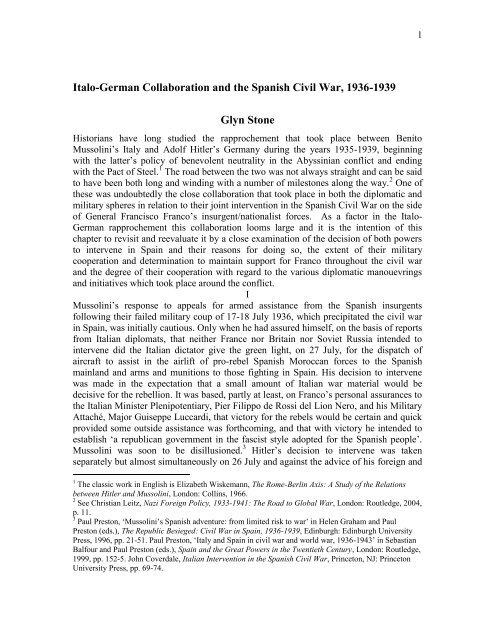Stone, G. (2009) Italo-German collaboration and the Spanish Civil ...
Stone, G. (2009) Italo-German collaboration and the Spanish Civil ...
Stone, G. (2009) Italo-German collaboration and the Spanish Civil ...
Create successful ePaper yourself
Turn your PDF publications into a flip-book with our unique Google optimized e-Paper software.
<strong>Italo</strong>-<strong>German</strong> Collaboration <strong>and</strong> <strong>the</strong> <strong>Spanish</strong> <strong>Civil</strong> War, 1936-1939<br />
Glyn <strong>Stone</strong><br />
Historians have long studied <strong>the</strong> rapprochement that took place between Benito<br />
Mussolini‟s Italy <strong>and</strong> Adolf Hitler‟s <strong>German</strong>y during <strong>the</strong> years 1935-1939, beginning<br />
with <strong>the</strong> latter‟s policy of benevolent neutrality in <strong>the</strong> Abyssinian conflict <strong>and</strong> ending<br />
with <strong>the</strong> Pact of Steel. 1 The road between <strong>the</strong> two was not always straight <strong>and</strong> can be said<br />
to have been both long <strong>and</strong> winding with a number of milestones along <strong>the</strong> way. 2 One of<br />
<strong>the</strong>se was undoubtedly <strong>the</strong> close <strong>collaboration</strong> that took place in both <strong>the</strong> diplomatic <strong>and</strong><br />
military spheres in relation to <strong>the</strong>ir joint intervention in <strong>the</strong> <strong>Spanish</strong> <strong>Civil</strong> War on <strong>the</strong> side<br />
of General Francisco Franco‟s insurgent/nationalist forces. As a factor in <strong>the</strong> <strong>Italo</strong>-<br />
<strong>German</strong> rapprochement this <strong>collaboration</strong> looms large <strong>and</strong> it is <strong>the</strong> intention of this<br />
chapter to revisit <strong>and</strong> reevaluate it by a close examination of <strong>the</strong> decision of both powers<br />
to intervene in Spain <strong>and</strong> <strong>the</strong>ir reasons for doing so, <strong>the</strong> extent of <strong>the</strong>ir military<br />
cooperation <strong>and</strong> determination to maintain support for Franco throughout <strong>the</strong> civil war<br />
<strong>and</strong> <strong>the</strong> degree of <strong>the</strong>ir cooperation with regard to <strong>the</strong> various diplomatic manouevrings<br />
<strong>and</strong> initiatives which took place around <strong>the</strong> conflict.<br />
I<br />
Mussolini‟s response to appeals for armed assistance from <strong>the</strong> <strong>Spanish</strong> insurgents<br />
following <strong>the</strong>ir failed military coup of 17-18 July 1936, which precipitated <strong>the</strong> civil war<br />
in Spain, was initially cautious. Only when he had assured himself, on <strong>the</strong> basis of reports<br />
from Italian diplomats, that nei<strong>the</strong>r France nor Britain nor Soviet Russia intended to<br />
intervene did <strong>the</strong> Italian dictator give <strong>the</strong> green light, on 27 July, for <strong>the</strong> dispatch of<br />
aircraft to assist in <strong>the</strong> airlift of pro-rebel <strong>Spanish</strong> Moroccan forces to <strong>the</strong> <strong>Spanish</strong><br />
mainl<strong>and</strong> <strong>and</strong> arms <strong>and</strong> munitions to those fighting in Spain. His decision to intervene<br />
was made in <strong>the</strong> expectation that a small amount of Italian war material would be<br />
decisive for <strong>the</strong> rebellion. It was based, partly at least, on Franco‟s personal assurances to<br />
<strong>the</strong> Italian Minister Plenipotentiary, Pier Filippo de Rossi del Lion Nero, <strong>and</strong> his Military<br />
Attaché, Major Guiseppe Luccardi, that victory for <strong>the</strong> rebels would be certain <strong>and</strong> quick<br />
provided some outside assistance was forthcoming, <strong>and</strong> that with victory he intended to<br />
establish „a republican government in <strong>the</strong> fascist style adopted for <strong>the</strong> <strong>Spanish</strong> people‟.<br />
Mussolini was soon to be disillusioned. 3 Hitler‟s decision to intervene was taken<br />
separately but almost simultaneously on 26 July <strong>and</strong> against <strong>the</strong> advice of his foreign <strong>and</strong><br />
1<br />
The classic work in English is Elizabeth Wiskemann, The Rome-Berlin Axis: A Study of <strong>the</strong> Relations<br />
between Hitler <strong>and</strong> Mussolini, London: Collins, 1966.<br />
2<br />
See Christian Leitz, Nazi Foreign Policy, 1933-1941: The Road to Global War, London: Routledge, 2004,<br />
p. 11.<br />
3<br />
Paul Preston, „Mussolini‟s <strong>Spanish</strong> adventure: from limited risk to war‟ in Helen Graham <strong>and</strong> Paul<br />
Preston (eds.), The Republic Besieged: <strong>Civil</strong> War in Spain, 1936-1939, Edinburgh: Edinburgh University<br />
Press, 1996, pp. 21-51. Paul Preston, „Italy <strong>and</strong> Spain in civil war <strong>and</strong> world war, 1936-1943‟ in Sebastian<br />
Balfour <strong>and</strong> Paul Preston (eds.), Spain <strong>and</strong> <strong>the</strong> Great Powers in <strong>the</strong> Twentieth Century, London: Routledge,<br />
1999, pp. 152-5. John Coverdale, Italian Intervention in <strong>the</strong> <strong>Spanish</strong> <strong>Civil</strong> War, Princeton, NJ: Princeton<br />
University Press, pp. 69-74.<br />
1

















